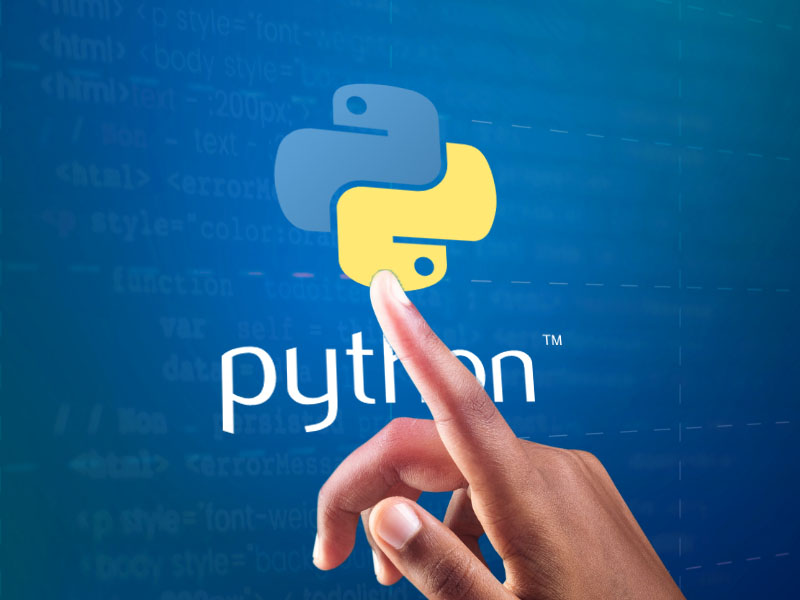10 Reasons to Choose Python for Your Next Project

Why Python? Why should we pick Python for our next project? What’s special that we should choose Python for our server-side development?
These are some of the questions that we have been answering for the past 14 years as a software agency, and in this post we will try to cover the Whys i.e. the important reasons to choose Python for your next project
Surpassing others, Python has become a go-to programming language for developing applications across areas. Despite stiff competition, it has established itself as the prominent language, as these compelling reasons summarize.
TIOBE’s index for 2023 has kept Python at the apex, with ratings of 13.33%. The position was the same even a year back, showing how Python reigns supreme in today’s programming landscape.
From web and mobile app development, machine learning and deep learning, IoT, and backend development, Python stands as the most universal programming language in today’s time. It’s a part of many mission-critical and strategically significant projects.
“Python makes us extremely productive, and makes maintaining a large and rapidly evolving codebase relatively simple,” remarked Mark Shuttleworth. Such abilities are contributing to the growth of Python, which is testified by thousands of large-scale applications, developed using the language, that are seamlessly functioning for enterprises across the world.
Simple to implement, but highly powerful and robust, Python comes with an ability to remain updated with the latest technological advances and unprecedented changes. The flexibility it offers is something that every developer cherises as its vastness encompasses everything to suffice the needs of any IT project. Eulogizing Python, we move forth and evaluate the reasons that make it an apt choice for any project.
Elegant syntax for enhanced clarity:-
Python’s elegant syntax contributes to heightened code clarity, cultivating an environment where developers collaborate seamlessly and grasp concepts effortlessly. This linguistic finesse simplifies translating abstract ideas into practical code, facilitating intricate tasks.
To illustrate, consider a scenario in which Python outshines another language like Java when dealing with list manipulation. While Java requires verbose coding for simple list operations:
- Java
Copy code
ArrayList<Integer> numbers = new ArrayList<>();
numbers.add(1);
numbers.add(2);
numbers.add(3);
Python achieves the same outcome with remarkable conciseness:
- Python
Copy code
numbers = [1, 2, 3]
This succinct approach expedites coding and minimizes room for errors, underscoring how Python’s elegance enhances clarity, streamlines collaboration, and fosters a profound understanding among developers.
Open-source pinnacle:
Python is an excellent open-source tool supported and encouraged by the Python Foundation. This means it’s free to use, modify, and share without restrictions. Plus, the Python developer community is vast and welcoming, with many people wanting to get involved, contribute, and share their open-source code.
And regarding web development, software creation, and mobile innovations, Python has fewer bugs and crashes, making projects more secure than other popular programming languages. Probably the reason it’s the number one answer when someone asks how to reduce software development cost while keeping quality and security high.
Python’s real-world success shines through companies like Dropbox, the widely-used cloud storage platform. They harnessed Python to construct their core infrastructure, enabling users to store, access, and share files across devices seamlessly. So, next time you save a file on Dropbox, remember that Python plays a behind-the-scenes role in making it all happen smoothly.
Ever-present community
Python’s large and tight-knit community is among those 10 reasons to learn python as it acts as a safety net, ensuring that you’ll never be left behind when you’re trying to solve problems, learn something new, or launch an innovative project.
When you enter the Python world, you’re not alone. A community of Python developers, enthusiasts, and experts gathers around you, ready to lend a hand whenever you hit a snag or need a hand.
So, whether you’re struggling with a coding error, trying to solve a complex puzzle, or trying to innovate, this community is always there to help. The Python community embodies collaboration and knowledge exchange through online forums, discussion boards, open-source collaborations, and tutorial sharing.
Ruling the world of data
Python is the go-to language for data science and analysis, and it’s no surprise why. It’s powered by some of the most popular web development frameworks like:
- NumPy:- If you’re into math, you’ll love NumPy – it’s the go-to library for numerical calculations. It supports arrays, matrices, and other math functions.
- Pandas:- Pandas is a must-have for data mining and analysis – it’s got all the data structures you need, like DataFrame and Series.
- Scikit-learn:- Scikit-learn is a tremendous machine-learning library with many algorithms, so you can build predictive models and do all kinds of machine-learning stuff.
- TensorFlow:- TensorFlow is an excellent open-source deep learning framework that lets you create and train neural networks for image recognition or natural language processing.
So, to take your project to the next level of data-driven empowerment through such highly powerful libraries from Python. Since it requires an excellent practical understanding of the implementation process, consider seeking assistance from an experienced Python application development company to get the most out of your data, from analyzing complex datasets to building predictive models and creating neural networks.
With Python, you can imagine a world where data takes care of itself with precision and the help of specialized libraries. From finance to healthcare, you can use Python to break down patterns, get insights and make intelligent decisions.
Module for endless possibilities
Think of Python’s vast repository, the Python Package Index (PyPI), as a universe of excellent tools. There are 147,000 packages, each adept at solving various problems with ease.
Just like a skilled artisan has a set of tools for different jobs, PyPI’s modules offer solutions for a wide range of issues. Do you need to do numerical calculations? There’s a module for that. Do you want to create complex visualizations? You’ve got a module for that too.
Developers find these modules invaluable because they benefit from pre-built tools instead of building from scratch. Whether you’re creating a web application with the assistance of the best web application development company, doing data analysis, or inventing new software solutions, these tools help speed up the development process. Python’s modules are thus indispensable tools that turn ideas into practical applications with greater efficiency and creativity.
Speed and Productivity
Python provides object-oriented design and capabilities to control the development process. It also possesses abilities to process text via its unit testing framework. The consolidation of these features makes the applications work dynamically and fast.
This is why Python development companies consider it one of the most convenient go-to options when selecting a programming language, and make them capable of offering an enhanced solution for their clients.
Web Prowess with Python Frameworks
Python provides powerful web development tools like Django and Flask. Not only do these tools simplify the process, but they also offer other benefits.
Let’s start with Django, a robust framework that provides a ready-to-use toolkit for building complex web applications. With Django, you don’t have to worry about database management, user authentication, or security. Instead, you can focus on creating unique, engaging user experiences. And if you want to leverage the Django framework and don’t know how to do it, connect with an experienced Django web development company to bring the most out of your project.
On the other hand, Flask offers a lighter approach. With Flask, you can customize your solutions and build websites tailored to your needs These frameworks also help teams work together more efficiently.
They follow well-organized coding patterns, which makes it easy for multiple developers to collaborate on the same project. This helps speed up project completion and ensure code quality.
Swift prototyping for innovation
Python’s agile development abilities act as a driving force in rapidly transforming abstract concepts into practical prototypes, providing the ideal platform to initiate bold innovations.
Now the question comes, why choose Python for prototyping? So it is the enabler bridging the gap between imagination and creation, allowing developers to convert creative ideas into practical prototypes quickly. For example, Instagram’s prototype was the beginning of a globally renowned social media platform. This expedited translation of ideas into applicable models enabled early testing and iteration.
Python’s prototyping speed is further supported by its compatibility with modern innovation methods. Additionally, Python’s extensive ecosystem and library support speed up the infusion of advanced features into prototypes, increasing their potential impact.
Paves the way for IoT, ML, and AI Fusion
Python emerges as the lynchpin that seamlessly converges the realms of the Internet of Things (IoT), machine learning (ML), and artificial intelligence (AI). This unification beckons developers to undertake a journey marked by innovation and transformation.
Python’s strength lies not only in its adoption of IoT but also in its ability to excel in the areas of machine learning and artificial intelligence (AI). Thanks to its robust technology stack, Python is the perfect tool for creating a unified synthesis, making it the go-to choice for intelligent applications. IoT, ML, and I are just a few examples of how Python’s versatility shines like a beacon for developers.
On the horizon of technology, the triumvirate of IoT, ML, and AI stands poised for a soaring trajectory. The forthcoming years promise to propel these domains to unparalleled heights, with Python standing steadfast as the chosen enabler. Its preference stems from its innate capability to facilitate the expansion of intricate applications that span the spectrum of these transformative technologies.
Python earns the trust of industry titans
Python is the go-to programming language for global giants like Google, Netflix, Instagram, and Facebook. It is no surprise that Google relies on Python in addition to Java and C++. Python played a crucial role in creating Google’s first search engine prototype. Python forms the foundation of Google’s entire technological stack. From Google’s Google App Engine to YouTube and code.my.com, Python’s influence spreads far and wide.
The same is true for Netflix, a pioneer in on-demand entertainment that uses Python’s power to manipulate, manage, and fortify its systems. and if you talk about social media, Facebook has adopted while C++ and Java work together to manage, scale, and sustain Facebook’s vast systems.
And the list of Python enthusiasts doesn’t end there. From NASA and PayPal to Bloomberg, Dropbox, Uber, and more, Python is trusted to build a wide range of systems, each providing innovation and reliability.
Now you are aware of the reasons to Choose Python, but do you know where you can use this language? If not, don’t scroll below.
Exploring the Multifaceted Applications of Python Programming Language in 2024
Python is a language that can be used in many different ways, and it’s great for many different industries and projects. If you’re interested in exploring the world of Python, here are some of the areas where it shines.
- Game development
The language isn’t confined to using Python for web development; it’s also a powerhouse for game development. Utilizing libraries like PySoy and PyGame, Python empowers game developers to create interactive and captivating games, driving innovations in the gaming industry.
- Embedded applications
Python’s compatibility with embedded systems is notable. Drawing parallels with the C programming language, Python empowers high-level applications on smaller devices like Raspberry Pi, showcasing its adaptability and versatility.
- Desktop GUI
It extends its reach to desktop application development. With libraries such as Tkinter, Kivy, and PYQT, Python simplifies the creation of user-friendly interfaces. This versatility caters to various applications, from calculators to to-do apps.
- Web scraping applications
Python’s prowess in web scraping is remarkable. Leveraging libraries like BeautifulSoup, developers can extract and process vast information from websites, serving diverse purposes such as job listings, market analysis, and research.
- Video and audio applications
Python’s reach extends to multimedia applications. Libraries enable the development of efficient video and audio tools, elevating performance and stability in media players like Cplay and TimPlayer.
- CAD applications
Complex domains like Computer-Aided Designing and Python streamline intricate tasks. As exemplified by Fandango, Python-based CAD applications simplify functions and object representation, revolutionizing design processes.
The Final Verdict
In the quest for a well-rounded, secure, robust, and search engine-friendly application, Python emerges as the epitome of excellence. We hope this guide has answered the question “Why use Python?” Whether functionality, security, or performance, Python excels on all fronts, ensuring that applications developed through Python development services are paragons within their categories. Integrating cutting-edge technologies like Big Data, AI, and ML further solidifies Python’s position as the ultimate choice for realizing your business requirements.
In the search for a complete, safe, reliable, and search engine-friendly application, Python stands out as the gold standard.
For those seeking proficient Python developers, Finoit offers a gateway to expertise. With over years of experience, we specialize in crafting unparalleled applications across diverse business verticals, delivering exceptional solutions that align seamlessly with your aspirations. For inquiries, contact info@finoit.com and launch a transformative journey with Python-powered solutions.


